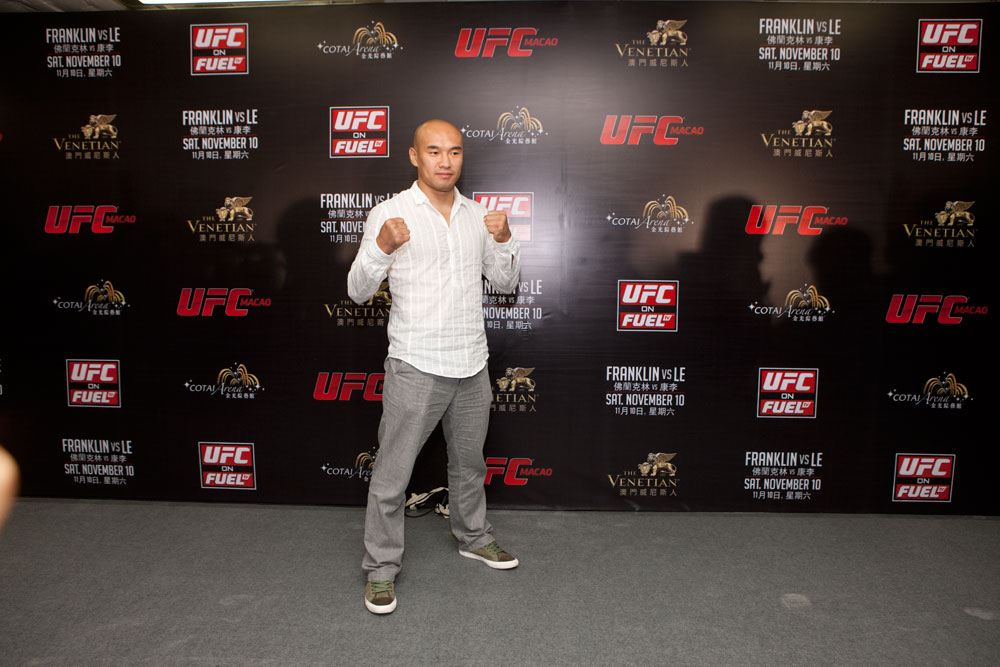 Octagon superstars Rich Franklin and Cung Le may be closing the show on the UFC’s first trip to China this Saturday, and some of Asia’s most accomplished veterans – like Takanori Gomi and Dong Hyun Kim – occupy main card slots on the UFC on FUEL TV main card, but the fighter who will have all eyes on him at the Cotai Arena in Macao as well as from those watching throughout China will be the only hometown hero on the bill – lightweight Tiequan Zhang.
Octagon superstars Rich Franklin and Cung Le may be closing the show on the UFC’s first trip to China this Saturday, and some of Asia’s most accomplished veterans – like Takanori Gomi and Dong Hyun Kim – occupy main card slots on the UFC on FUEL TV main card, but the fighter who will have all eyes on him at the Cotai Arena in Macao as well as from those watching throughout China will be the only hometown hero on the bill – lightweight Tiequan Zhang.
But “The Wolf,” a native of Inner Mongolia now making his home in Beijing, is not letting this momentous occasion overshadow the task at hand, which is fighting and beating Jon Tuck.
“I am so excited and proud,” said Zhang through translator Julie Zhang. “But I’m not thinking about anything but focusing on the upcoming fight and to do my best in front of my people.”
This moment has been a long time coming for not just China, but for the 34-year-old Zhang. A lifelong martial artist who wrestled and competed in Sanda, Zhang turned pro as a mixed martial artist in 2005, quickly becoming the best his nation had to offer in a sport few understood.
“Chinese people liked kung fu, but they didn’t know MMA very well,” said Zhang of the early days competing at home. And like his peers, while they stayed active and developed their skills, until one of them broke through in a major promotion, nothing would truly take off.
In 2010, Zhang became China’s breakthrough fighter, debuting in the WEC with a first round submission win over Pablo Garza. Suddenly, Zhang was a star at home.
“More and more people became interested in MMA,” he said. “My amount of Weibo (a Chinese social networking site) followers went to over 20,000 after my first fight in WEC.”
Those followers have multiplied and multiplied since, and while he lost his next WEC bout to Dan Downes in December of 2010, his UFC debut was a successful one, as he submitted Jason Reinhardt in 48 seconds at UFC 127, making his featherweight debut in the process.
Firmly established in the big leagues, Zhang nonetheless hit a bump in the road in his next two bouts, losing back-to-back fights to Darren Elkins and Issei Tamura. But with the idea of fighting in China becoming a reality, Zhang decided that if he wanted to be at his peak for the biggest night of his career, he would do it at 155 pounds.
“It’s more appropriate for me because there’s not too much weight to cut down,” he said. “I want to be at my best in Macao.”
Looking to spoil the homecoming is unbeaten Guam prospect Jon Tuck, a fighter remembered by UFC fans for losing a close decision to Al Iaquinta on season 15 of The Ultimate Fighter. Zhang is respectful of his foe, but confident of the end result, especially given the high stakes involved.
“Everybody is the same,” he said. “My opponents, I only know to beat them. And I know this will be a tough fight, but I’m excited. I am thrilled that the UFC has given me this opportunity to prove myself in front of the Chinese fans in my home country. But I realize I need a win if I am to revitalize my career with the UFC; this fight is do or die for me so you can be sure I will come ready for war.”
Yet no matter what happens on Saturday, Zhang has already done something few fighters can claim – he has pioneered a sport in his home country. And while he admits that there are still mountains to climb in terms of getting more fighters more fights and then into the big shows, the groundwork he’s laid down already has made him a role model to his fellow athletes.
“We have a lot of good coaches, but not enough fights to make money,” he said of the challenges facing the sport at home. “Chinese MMA fighters are working hard, but don’t get their due reward. I am proud that I can be the first Chinese fighter in the UFC, and glad if I can help the younger fighters to find a better way in their career.”
That’s a lot more important than wins and losses, but oh what a night it will be in Macao if Zhang can win. And that’s what he’s planning to do.
“Trust me,” he said, “you will see a fantastic fight.”